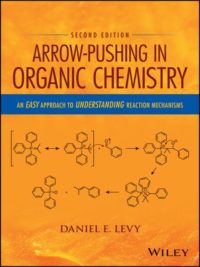ARROW PUSHING IN ORGANIC CHEMISTRY
DANIEL E. LEVY
The best material for organic chemistry by daniel e levy .An easy approach to understanding Reaction Mechanisms:
According to author:
Organic chemistry is a general requirement for most students pursuing degrees in the fields of biology, physiology, medicine, chemical engineering, biochemistry, and chemistry.
Consequently, many of the students studying organic chemistry initially do so out of obligations to required curriculum rather than out of genuine interest in the subject. This is, in fact, expected as almost all college students find themselves enrolling in classes in which they either have no interest or cannot foresee application of the subject to their future vocation.
Alternatively, there are students who are intrigued with the potential application of organic chemistry to fields including pharmaceuticals, polymers, pesticides, food science, and energy. However, whichever group represents the individual students, there is always a common subset of each that tenuously approaches the study of organic chemistry due to rumors or preconceived notions that the subject is extremely difficult and requires extensive memorization.
Having personally studied organic chemistry, and tutored many students in the subject, I assure you that this is not the case. When first presented with organic chemistry course material, one can easily be caught up in the size of the book, the encyclopedic presentation of reactions, and the self-questioning of how one can ever decipher the subject. These students frequently compile endless sets of flash cards listing specific chemical reactions and their associated names.
Like many of my classmates, I began to approach the subject in this manner. However, this strategy did not work for me as I quickly realized that memorization of reactions did not provide any deductive or predictive insight into the progression of starting materials to products and by what mechanisms the transformations occurred.
In fact, the fundamental fault in the “memorization strategy” is that in order to be effective, the student must not only memorize all chemical reactions and associated reaction names, but also all associated reaction mechanisms and potential competing processes. It was not until I abandoned the memorization
strategy that I began to do well in organic chemistry and develop a true appreciation for the subject and how the science benefits society.
Content:
- Introduction
- Acids
- Bases and nucleophiles
- SN2 substitution Reactions
- SN1 substitution Reactions
- Elimination Reactions
- Addition Reactions
TO DOWNLOAD CLICK HERE:
Arrow pushing in organic chemistry-Daniel E levy PDF
Also see:
Farncis A Carey organic chemistry pdf






![[PDF] NCERT books for class11 Business Studies Download 2022-23 [PDF] NCERT books for class11 Business Studies Download 2022-23](https://jeemain.guru/wp-content/uploads/2021/12/jeemain-guru-555321.hostingersite.com-26-100x70.jpg)
![[PDF] Download Motion IIT physics Theory Download Motion IIT physics Theory](https://jeemain.guru/wp-content/uploads/2018/11/Download-Motion-IIT-physics-Theory-100x70.jpg)